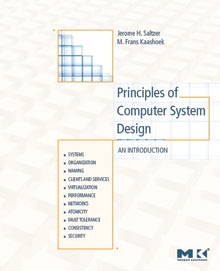
|
FreeComputerBooks.com
Links to Free Computer, Mathematics, Technical Books all over the World
|
|
- Title: Principles of Computer System Design: An Introduction
- Author(s) Jerome H. Saltzer, M. Frans Kaashoek
- Publisher: Morgan Kaufmann (July 7, 2009); eBook (Creative Commons Licensed by MIT)
- License(s): Creative Commons License (CC)
- Paperback: 560 pages
- eBook: PDF
- Language: English
- ISBN-10: 0123749573
- ISBN-13: 978-0123749574
- Share This:

|
This is a unique, ambitious, and important book. It is about computer system design principles, and not the usual mechanics of how things work. These principles are typically embedded in research papers.
This is the first textbook to take a principles-based approach to the computer system design. It identifies, examines, and illustrates fundamental concepts in computer system design that are common across operating systems, networks, database systems, distributed systems, programming languages, software engineering, security, fault tolerance, and architecture.
About the Authors- Jerome H. Saltzer is an American computer scientist.
- Computer System, Organization, and Architecture
- Assembly and Machine Languages
- Electronics and Chips Design/Programming
- Computer Hardware, Personal Computers, and the History of Computers
- Computer Operating Systems
- Electronic and Computer Engineering

- Principles of Computer System Design: An Introduction (Jerome H. Saltzer, et al)
- The Mirror Site (1) - PDF
- The Mirror Site (2) - PDF
-
 Computer Organization and Design Fundamentals
Computer Organization and Design Fundamentals
This book takes the reader from the basic design principles of the modern digital computer to a top-level examination of its architecture. The material is presented using practical terms and examples for a better computer systems design.
-
 Basic Computer Architecture (Smruti R. Sarangi)
Basic Computer Architecture (Smruti R. Sarangi)
This book is a comprehensive text on basic, undergraduate-level computer architecture. It includes the combinational units, ALUs, processor, basic 5-stage pipeline, and a microcode-based design.
-
 Computer Systems: A Programmer's Perspective, 2nd Edition
Computer Systems: A Programmer's Perspective, 2nd Edition
This book introduces the important and enduring concepts that underlie computer systems by showing how these ideas affect the correctness, performance, and utility of application programs.
-
 The Elements of Computing Systems: Building a Modern Computer
The Elements of Computing Systems: Building a Modern Computer
This book gives a refreshingly new way of looking at computer systems as a whole by considering all aspects of a complete system in an integrated manner, as its comes to play in the construction of a simple yet powerful computer system.
-
 Scientific Programming and Computer Architecture
Scientific Programming and Computer Architecture
The book digs into linkers, compilers, operating systems, and computer architecture to understand how the different parts of the computer interact with programs. It begins with a review of C/C++ and explanations of how libraries, linkers, and Makefiles work.





